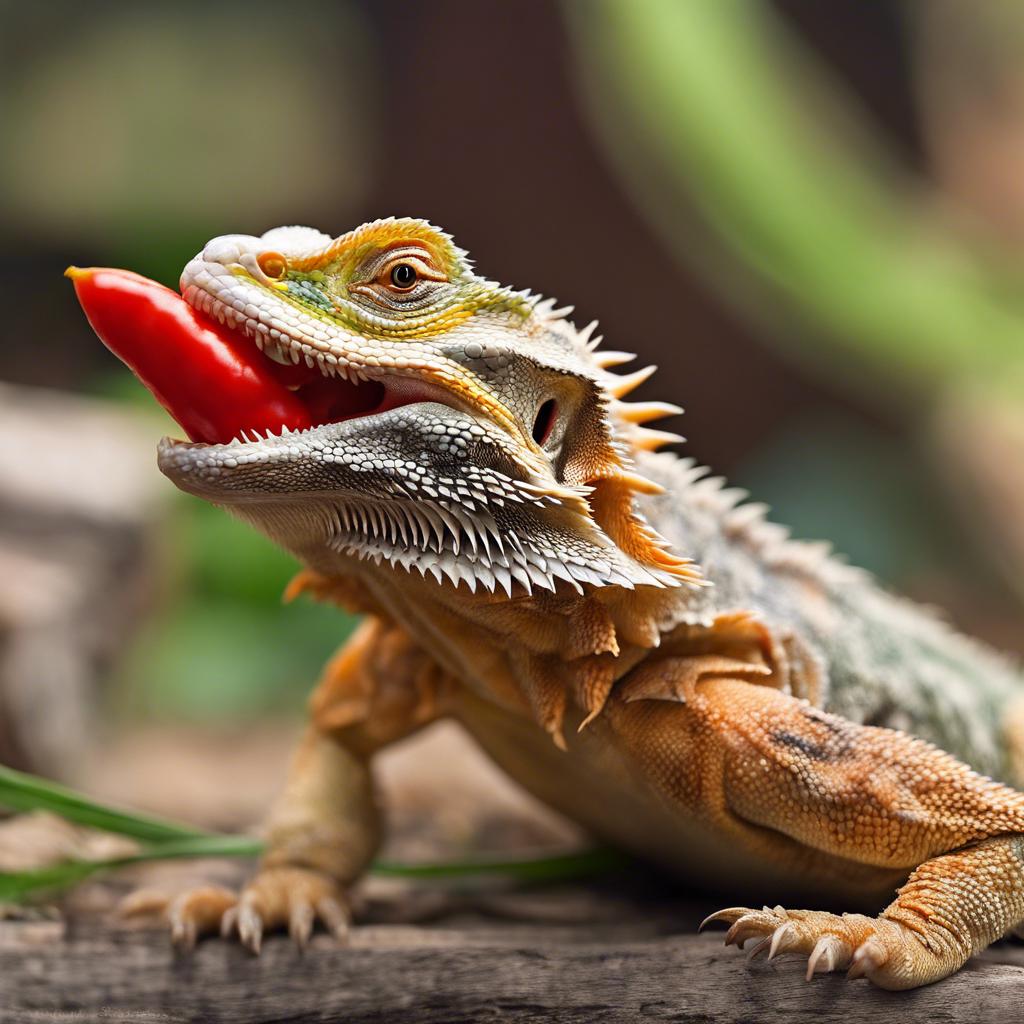Bearded dragons are popular reptile pets known for their unique appearance and docile nature. These reptiles are native to Australia and have become increasingly popular as pets due to their friendly demeanor and relatively low maintenance requirements. One of the most important aspects of caring for a bearded dragon is providing them with a proper diet that meets their nutritional needs.
Proper nutrition is crucial for the overall health and well-being of bearded dragons. A balanced diet ensures that they receive all the necessary nutrients to support their growth, development, and immune system. Without a proper diet, bearded dragons can suffer from various health issues, including metabolic bone disease, vitamin deficiencies, and digestive problems.
Key Takeaways
- Bearded dragons are popular pets that require a balanced diet to stay healthy.
- Bell peppers are a nutritious vegetable that can be included in a bearded dragon's diet.
- Bell peppers are high in vitamin C, which is important for a bearded dragon's immune system.
- Bearded dragons should only be fed bell peppers in moderation to avoid digestive issues.
- Bell peppers should be washed and cut into small pieces before being fed to a bearded dragon.
Nutritional Requirements of Bearded Dragons
Bearded dragons require a combination of protein, vegetables, and fruits in their diet to thrive. Protein is essential for muscle development and growth, while vegetables provide essential vitamins and minerals. Fruits are a great source of natural sugars and additional vitamins.
The recommended ratio for a bearded dragon's diet is approximately 70% vegetables, 20% protein, and 10% fruits. This ensures that they receive a balanced mix of nutrients without overloading on any particular food group. It's important to note that the specific nutritional requirements may vary depending on the age and size of the bearded dragon.
Understanding Bell Peppers
Bell peppers, also known as sweet peppers or capsicum, are a popular vegetable known for their vibrant colors and mild flavor. They come in various colors, including green, red, yellow, and orange. Bell peppers are rich in vitamins and minerals, making them a nutritious addition to any diet.
Bell peppers are low in calories and high in fiber, making them an excellent choice for weight management. They are also packed with antioxidants that help protect the body against free radicals and reduce the risk of chronic diseases.
Nutritional Value of Bell Peppers
Bell peppers are a nutritional powerhouse, containing a wide range of vitamins and minerals. They are particularly rich in vitamin C, vitamin A, and vitamin B6. Vitamin C is essential for immune function and collagen production, while vitamin A is important for vision and skin health. Vitamin B6 plays a crucial role in brain development and function.
In addition to vitamins, bell peppers also contain minerals such as potassium, magnesium, and iron. Potassium helps regulate blood pressure and fluid balance in the body, while magnesium is important for bone health and energy production. Iron is necessary for the production of red blood cells and oxygen transport.
The nutritional value of bell peppers can vary depending on their color. Red bell peppers are the ripest and contain the highest amount of vitamins and antioxidants. Green bell peppers are less ripe and have a slightly bitter taste, but they still provide a good amount of nutrients. Yellow and orange bell peppers fall somewhere in between, offering a balance of flavor and nutritional content.
Can Bearded Dragons Eat Bell Peppers?
Yes, bearded dragons can eat bell peppers as part of their diet. Bell peppers are safe for bearded dragons to consume and provide them with essential vitamins and minerals. However, it's important to feed them in moderation and ensure that they are prepared properly.
Benefits of Feeding Bell Peppers to Bearded Dragons

Including bell peppers in a bearded dragon's diet can offer several benefits. Firstly, they provide a good source of vitamin C, which is important for their immune system. Vitamin C helps protect against illness and supports overall health.
Bell peppers also contain vitamin A, which is essential for bearded dragons' vision and skin health. This vitamin helps maintain healthy eyesight and promotes proper shedding of their skin.
Additionally, bell peppers are low in calories and high in fiber, making them a great option for weight management in bearded dragons. The fiber content helps regulate their digestive system and prevent constipation.
Risks and Precautions of Feeding Bell Peppers to Bearded Dragons
While bell peppers are generally safe for bearded dragons, there are a few risks and precautions to keep in mind. Firstly, it's important to remove the seeds and stems from the bell peppers before feeding them to your pet. These parts can be difficult for bearded dragons to digest and may cause digestive issues.
It's also important to feed bell peppers in moderation. While they provide essential nutrients, they should not make up the majority of a bearded dragon's diet. Variety is key when it comes to their nutrition, so it's important to offer a mix of vegetables, protein, and fruits.
Lastly, it's important to ensure that the bell peppers are fresh and free from any pesticides or chemicals. Organic bell peppers are the best option, as they are grown without the use of harmful chemicals.
How to Prepare Bell Peppers for Bearded Dragons
Preparing bell peppers for bearded dragons is relatively simple. Start by washing the bell peppers thoroughly to remove any dirt or residue. Next, cut off the stem and remove the seeds from the inside. Be sure to discard the seeds, as they can be difficult for bearded dragons to digest.
After removing the seeds, you can slice the bell peppers into small, bite-sized pieces. This makes it easier for your bearded dragon to eat and digest. It's important to serve the bell peppers raw, as cooking them can destroy some of their nutritional value.
Other Vegetables Suitable for Bearded Dragons
In addition to bell peppers, there are several other vegetables that are safe and healthy for bearded dragons to eat. Some examples include:
– Leafy greens: Kale, collard greens, mustard greens, and dandelion greens are all excellent choices for bearded dragons. They are rich in vitamins and minerals and provide essential fiber.
– Squash: Butternut squash and acorn squash are both safe for bearded dragons to eat. They are high in vitamin A and provide a good source of hydration.
– Carrots: Carrots are a great source of beta-carotene, which is converted into vitamin A in the body. They should be grated or cooked to make them easier for bearded dragons to eat.
– Zucchini: Zucchini is low in calories and high in water content, making it a hydrating option for bearded dragons. It can be served raw or cooked.
Bell Peppers as a Healthy Addition to Your Bearded Dragon's Diet
In conclusion, bell peppers are a nutritious and safe addition to a bearded dragon's diet. They provide essential vitamins and minerals, including vitamin C, vitamin A, and potassium. Bell peppers can support their immune system, vision, and overall health.
When feeding bell peppers to bearded dragons, it's important to remove the seeds and stems and serve them in moderation. Variety is key when it comes to their diet, so it's important to offer a mix of vegetables, protein, and fruits.
By including bell peppers and other vegetables in their diet, you can ensure that your bearded dragon receives a balanced and nutritious meal that supports their growth and well-being.
If you're curious about whether bearded dragons can eat bell peppers, you might also be interested in learning about their dietary preferences and restrictions. Reptile Wizard has a helpful article that explores the topic of what bearded dragons can and cannot eat. To gain a better understanding of their nutritional needs, check out their informative article on can bearded dragons eat black olives. It's always important to ensure that you're providing your pet with a balanced and appropriate diet. For more information, please refer to Reptile Wizard's disclaimer and privacy policy.
FAQs
What is a bearded dragon?
A bearded dragon is a type of lizard that is native to Australia. They are popular pets due to their docile nature and unique appearance.
Can bearded dragons eat bell peppers?
Yes, bearded dragons can eat bell peppers. Bell peppers are a good source of vitamin C and other nutrients that can benefit a bearded dragon's health.
Are there any risks to feeding bearded dragons bell peppers?
While bell peppers are generally safe for bearded dragons to eat, it is important to avoid feeding them too much. Overfeeding bell peppers can lead to digestive issues and other health problems.
How should bell peppers be prepared for bearded dragons?
Bell peppers should be washed thoroughly and cut into small pieces before being fed to a bearded dragon. It is also important to remove any seeds or stems, as these can be difficult for the lizard to digest.
What other foods can bearded dragons eat?
Bearded dragons can eat a variety of fruits, vegetables, and insects. Some good options include leafy greens, carrots, squash, crickets, and mealworms.

